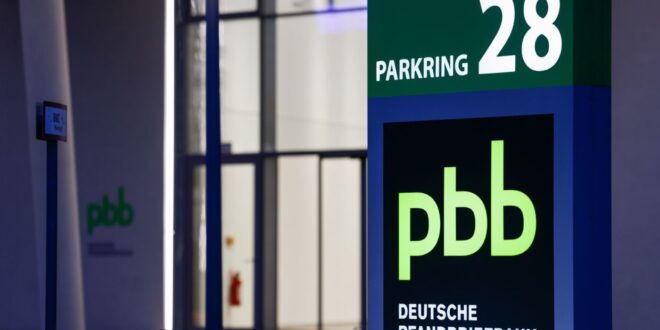AS commercial real estate values crumble in the United States and parts of Europe, so far there’s no evidence of systemic risk spreading through the financial system.
What happens next at the German specialist real estate lender Deutsche Pfandbriefbank AG, though, may presage whether the pressure remains localised – or whether the property slump becomes a more widespread problem.
PBB, as it’s known, has a balance sheet worth about €49bil (US$53bil), including US$27bil of European real estate exposure and €5bil of loans to the US property market.
Its market capitalisation, though, is an ultra skinny €605mil – yes, million, after a near 50% drop in its share price during the past year.
Nervousness about the lender’s profitability and possible losses has seen its market value fall to 20% of its book value this week, from 52% in early 2022. That’s unsustainable if funding becomes unavailable.
Running out of road
The firm is both too small to survive in its current form, but also too big to fail given the repercussions if it were to cross over the regulatory point of non-viability. It’s vulnerable to a loss of confidence from investors, depositors, regulators and credit rating companies.
Several event-risk hedge funds have short positions in its debt and equity.
Digging its way out of an asset valuation hole is hampered by its weak earnings. Even raising debt is going to be a struggle – let alone fresh equity.
Its viability may not be immediately in question but its business model is broken. Remember that the European Central Bank (ECB) moved on failing Spanish lender Banco Popular without warning in 2017 by selling it to Banco Santander SA for one euro.
PBB eschews riskier lending to property developers in favour of loans on existing tenanted buildings. But as the global financial crisis showed, when property valuations turn lower, the decline can become indiscriminate.
Unfortunately, the pandemic has hollowed out city centre office occupancy. Once-prime buildings no longer command premium rents as tenants increasingly prefer energy efficient spaces.
If central banks start cutting rates aggressively and commercial real estate sentiment improves, then the reality may not be as bleak as current perceptions.
As my colleague Paul Davies wrote this week, it’s not so much about contagion in the property sector but how a bank’s collapsing share price affects its peers.
Man Group Plc portfolio manager Jonathan Golan believes portions of the market are in “very deep trouble.”
Over the past year, European property funds have seen retail investor outflows of more than €1bil per month.
S&P Global Ratings lowered PBB’s senior debt rating to BBB in November, with a negative outlook.
Two more cuts would put its bonds in the junk category, and there’s a growing risk of further downgrades as the drumbeat of negativity around real estate gets louder.
A €421mil senior bond matures in September; its 0.125% coupon is a reflection of how the interest rate environment has changed as it would now have to pay closer to 7%.
Refinancing debt at these elevated borrowing costs risks exacerbating its predicament of being a mouse supporting a debt elephant.
While the company asserts that it exceeds its capital requirements, a major injection of fresh capital may soon be required. To be fair, it’s raised €2.5bil in the Pfandbriefe market – bonds secured by property mortgages – over the last six months, including a Swedish krona deal in late January.
Relying on secured covered bond issuance may buy it some time, but regulators want to see funding ability across the capital stack.
Primarily, this is a problem for owners of the equity and the riskier type of debt that regulators can cancel in event of failure.
Most of its depositors are covered up to €100,000 under the eurozone guarantee scheme. The German pfandbriefe system is designed to withstand a lot of pressure and is proud of its spotless credit history.
There’s never been a default in German covered bonds because even if issuers have failed, liabilities have been taken on by stronger entities.
It’s on-balance-sheet securitisation relying firstly on the issuer’s corporate guarantee but secured underneath by title to over-collateralised assets – which are replaced if substandard.
However, valuations are backward-looking and not marked regularly to current market levels.
Unrealistic marks
Bad, unrealistic marks are the key issue. PBB has made increasing provisions, notably to its New York office lending, but confidence is low over how rigorous these might be.
It’s just-raised 2023 loan-loss provision guidance doesn’t fully reflect property market weakness, according to Bloomberg Intelligence analyst Tomasz Noetzel.
No one is required to buy its bonds or commercial paper, which means market counterparties can simply choose to no longer conduct business with it.
It’s no longer part-owned by any state entities, so there’s no obvious safety net. It has to pay back more than €1bil of ECB funding this year, around 20% of its interbank exposure.
It can access other ECB funds, but these can be expensive and come at a reputational cost. Similarly, although PBB has €7bil of deposits, it has no branch network.
This funding relies on offering competitive interest rates on the Internet; about €1bil is in instant access accounts and can be withdrawn immediately.
Bail-in risk
The coupons on €300mil of the riskiest Tier-1 debt can be suspended, but that won’t move the dial. By design, that debt is there to be bailed-in by the regulators – along with whatever equity value is left.
Next in line is €550mil of subordinated Tier-2 debt. Above that,€340mil of senior non-preferred debt from small private placements can also be completely cancelled, though that would set a post-euro crisis precedent.
In all, that asset class offers a buffer of only €1.8bil which is less than half of PPB’s exposure to the US office sector.
BaFin, the German banking regulator, says it’s monitoring the situation, but PPB also falls directly under the ECB’s regulatory purview.
The central bank didn’t waste much time late last year in pushing banks to take the hit on exposure to Austrian real estate tycoon Rene Benko’s Signa Holdings.
The German commercial property sector is already in a mess, and if PBB had to crystallise its losses, it could further destabilise the entire sector – hence its status as too-big-to-fail.
Regulation 101 suggests the best approach is to manage the situation carefully and avoid fire sales.
BaFin president Mark Branson said in November that German property troubles won’t spark a crisis but the situation is only worsening. At the moment, PBB is only having to deal with provisions against possible losses rather than actual writedowns.
It’s time to circle the wagons and work out a ring-fenced runoff solution that protects as many of the parts as possible. — Bloomberg Marcus Ashworth is a Bloomberg Opinion columnist covering European markets. The views expressed here are the writer’s own.
 BeritaKini.biz Berita Viral Terkini di Malaysia
BeritaKini.biz Berita Viral Terkini di Malaysia





